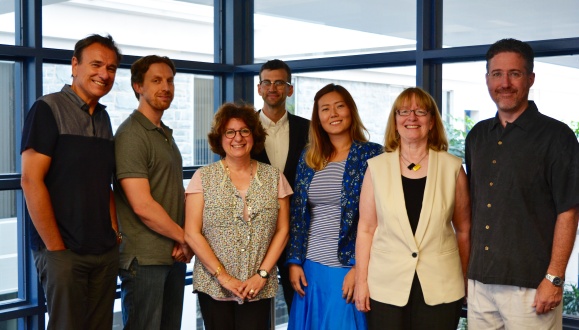News
» Go to news mainIP on the ground

In the mid-2000s, Myra Tawfik ‚Äď a law professor and EPICentre professor of IP commercialization and strategy at the University of Windsor ‚Äď noticed a push from the Ontario government to increase the number of accelerated entrepreneurship programs for STEM* students on university campuses. The goal? To give innovators the business skills necessary to launch a pilipili¬ĢĽ≠ful startup.
But Tawfik noticed a key player excluded from this process: law. Who would help these young entrepreneurs navigate the legal issues involved in building a business?
These questions led to Tawfik’s co-directorship of the Centre for Enterprise and Law (CEL) at the University of Windsor in 2010. CEL split into two ventures in 2013, the based in the Faculty of Business and the based at the Faculty of Law. The two ventures continue to cooperate to provide information and advice to start-ups. In 2014, Tawfik was appointed a senior fellow at the Centre for International Governance Innovation (CIGI) to continue her work on capacity-building in IP literacy, IP strategy, and access to affordable IP legal services for startups and entrepreneurs.
There’s a lot of energy here that’s a bit like a coiled spring. Now it’s being unleashed. There’s a lot of work that’s going to be done this year to push in exactly this direction. - Prof. Robert Currie
Sitting opposite a group of faculty members associated with the Schulich School of Law’s a few days ago, Tawfik discussed her work at these various centres. She recommended law schools across the country play a more active role in helping students provide IP-based legal services for startups in their communities.
In today‚Äôs ‚Äúentrepreneurial university,‚ÄĚ says Tawfik, ‚Äúthere‚Äôs a huge push to get students to invent something that‚Äôs going to radically change the world.‚ÄĚ But the legal needs of these young entrepreneurs are ‚Äď as of right now ‚Äď unmet, she says, as firms can be reluctant to take on startups as clients. At their earliest stages, startups are often unable to pay for legal advice, and often need considerable attention, mentoring, and direction that lawyers aren‚Äôt always able to provide.
Through clinics and other experiential programs, says Tawfik, law students can help fill this gap.
‚ÄúThere‚Äôs a moment now where law schools should be looking more closely at providing more of these skills-based programs, especially in the area of IP. It‚Äôs ironic: we always say Canada has too many lawyers, but, in some respects, we don‚Äôt have enough of some kinds of lawyers. If we are really convinced that we want to compete globally, we‚Äôre going to have to start paying attention to how we deal with intellectual property on the ground.‚ÄĚ
IP at pilipili¬ĢĽ≠ and Schulich Law
Professor , director of Schulich‚Äôs , says it‚Äôs ‚Äúexactly the right moment‚ÄĚ for development in this area at pilipili¬ĢĽ≠. An IP clinic, he says, is a ‚Äúdistinct possibility‚ÄĚ for the future.Őż
‚ÄúThere‚Äôs a lot of energy here that‚Äôs a bit like a coiled spring. Now it‚Äôs being unleashed,‚ÄĚ says Currie. ‚ÄúThere‚Äôs a lot of work that‚Äôs going to be done this year to push in exactly this direction.‚ÄĚ
In addition to reinvigorating Dalhousie’s collaborative program, Currie wants to tap into the existing partnership between Dalhousie's faculties of computer science, management, and law.
‚ÄúThis kind of partnership is uniquely positioned to begin to build capacity here to engage with startup culture and the monetization of intellectual property,‚ÄĚ says Currie. ‚ÄúHaving Professor Tawfik here to offer advice on what clinical education looks like in this context ‚Äď and tell us a few of the pitfalls to avoid ‚Äď will be invaluable for us as we move forward.‚ÄĚ
Currie hopes continued development will make Dalhousie ‚Äúa place of interdisciplinary learning and application in this area so industry can come to us as problem solvers, as testers, and as a place to workshop new ideas,‚ÄĚ says Currie. ‚ÄúThere‚Äôs so much potential here, it‚Äôs ridiculous.‚ÄĚ
Őż
*STEM refers to the disciplines of science, technology, engineering, and mathematics.
Őż
Recent News
- Associate Professor Andrew Flavelle Martin ft in "Immunity for Alberta attorney general necessary to ward off ‚Äėpolitical activism,‚Äô attorney general says"
- Professor Emeritus Wayne MacKay ft in "N.S. RCMP says it was already tackling illegal cannabis before minister's directive"
- Professor Emeritus Wayne MacKay ft in "Mi’kmaq chiefs and law expert weigh in on Nova Scotia’s cannabis directive to police"
- Professor Emeritus Wayne MacKay ft in "Nova Scotia wants crackdown on illegal cannabis, asks Mi'kmaq chiefs for support"
- Professor Emeritus Wayne MacKay ft in "What's at stake as the Supreme Court weighs changes to the Jordan limits for how long a trial can take"
- Meet Instruction & Public Services Librarian Kristan Belanger
- Professor Emeritus Wayne MacKay ft in "Hard lessons"
- Professor Rob Currie ft in "Lawyer accused in Ryan Wedding case appears in court as part of extradition proceedings"
